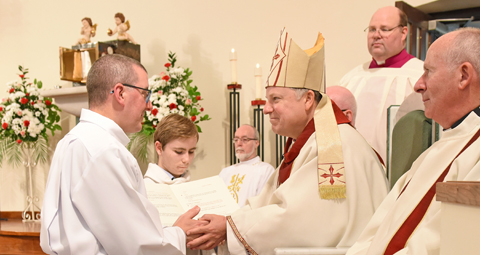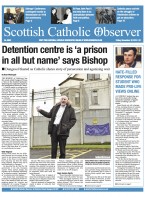BY Peter Diamond | September 21 2018 | ![]() 0 COMMENTS
0 COMMENTS ![]() print
print

Number of candidates for the permanent diaconate in Scotland reach all time high
Publication Date: 2018-09-21
Scotland is ‘breaking through barriers,’ says national director for programme
PAISLEY Diocese welcomed another deacon to their flock this week as the number of applications to the permanent diaconate in Scotland reached a record high.
Deacon Paul Graham, a chaplain for NHS Lanarkshire, formally assumed his new role in the Church on Wednesday September 12, where he was joined by principal celebrant Bishop Keenan of Paisley Diocese.
The welcome addition coincided with the news that the number of applications for the permanent diaconate has doubled within one year to 17.
The candidates will undertake a one-year propaedeutic period before going on to complete the four-year Bachelor course in Divinity at the Maryvale Institute in Birmingham.
The number of deacons in Scotland is continuing to rise with nearly 100 full-time and part-time men in ministry across the country.
Bishop John Keenan, president of Priests for Scotland, said: “It is great news for the Catholic Church in Scotland to see, this year, the biggest number of candidates for the permanent diaconate.
“We have been praying faithfully for vocations all these years and now experience the joy of God answering our prayers.
“I would like to extend a special thanks to our vocations directors for their commitment and dedication in helping identify and accompany those who have answered God’s call with humility and a sincere heart.”
Sharp increase
Deacon Graham Kelly, 61, is the national director for the Bishops’ Conference of Scotland’s commission for the permanent diaconate.
Deacon Kelly, who is from Paisley Diocese, said: “We have 17 candidates who are about to start their propaedeutic period of one year before going on to another four years of studies.
“We usually have between six to eight candidates per year but there has been a sharp rise in applications and the role of deacons within Scotland has grown over the years and is continuing to grow.
“The number of deacons in Scotland now is about 100 with some of that figure perhaps not in full-time ministry, as like priests we are also advised to offer our retirement at 75.
“Each diocese recruits differently but now we are breaking through barriers, which may have, previously existed around the perceived role or need for deacons in Scotland.
“The bottom line is that deacons are coming out of four years study with a great qualification in Bachelor of Divinity and have a good knowledge of theology, good practical liturgy and parish skills.
“Chaplains are vital to the Church and many deacons take up a full-time chaplaincy whether it be in prisons, schools or hospitals.
“We can perform Sacraments, including Baptism and of course we have an important role in proclaiming the Gospel each week at Mass.”
Deacon Kelly has been ordained in Paisley Diocese for 12 years and served in three different parishes. Married with two children and two grandchildren, he says he is widely accepted as clergy.
“We come in all forms and there is a varying degree of backgrounds and age ranges,” he added.
“Some are teachers, businessmen, academics and we have also had an application from a full-time charge nurse at a hospital in Glasgow.
“I love being a deacon and I would say it’s the greatest thing I’ve ever done. It’s obviously a calling. You sometimes are asked the question, how can I give a bit more to the Church and I just felt it was the piece of the jigsaw that was missing in my life.”
The four-year course for an applicant to the permanent diaconate includes doctrinal, pastoral, personal, intellectual and spiritual formation.
The distance learning programme—run through the Maryvale Institute in Birmingham—is key to the formation of permanent deacons, who are expected to commit from 15 to 20 hours per week to home study and complete a number of written assignments.
The academic year starts in July and ends the following June. During the propaedeutic year candidates for the diaconate five-year course meet up at the Conforti Institute in Coatbridge four times.
A report is then completed by the diocesan vocations director and sent to the bishop who will then decide if the candidate is successful or not. Throughout the rest of the course students meet up together four times per year at St Mary’s Kinnoull Monastery in Perth.
Holy spirit
Deacon Jim Aitken, assistant director for the permanent diaconate of Motherwell Diocese, said: “We are very happy with the numbers this year. The highest figure we’ve ever had since the diaconate was introduced to Scotland was 12 and the highest number in the last five years has been nine.
“I think what has prompted the increase is perhaps the Holy Spirit working in the Church. As the more deacons there are in parishes the more the laity see the positive role of the deacon and I guess naturally people begin to explore the idea of it themselves.”
The number of candidates from Motherwell Diocese this year has peaked at eight after not having any for two years; something Deacon Aitken knows will be hard to beat.
“Going forward it’s hard to maintain these figures so it may not necessarily be 17 next year,” he said. “There isn’t a seminary with allocated staff to help the deacons so the assistance comes from priests and deacons from the diocese.”
The cost per year to fund a deacon is £1,500 whereas to fund a seminarian the cost is £22,000.
“Generally the applicants are in their 40’s to early 60’s and usually most of them are married, however five candidates who put themselves forward this year are unmarried men,” Deacon Jim Aitken said.
“Wives and families play a key role in helping Scotland’s future deacons and we try to involve the families particularly the wives from an early stage of the process. Before a married man becomes a deacon, his wife has to provide a handwritten letter to the bishop of her approval of his vocation.”
Delight
Newly ordained Deacon Paul Graham of Paisley Diocese said: “I’m really looking forward to it—after six years of studies I’m just delighted to be getting on with it now.”
He explained that before beginning his journey he spoke to some people from America, where the permanent diaconate has been around for much longer than it has in Scotland, who told him that deacons make a huge difference in the life of the parish community.
Regarding his ordination, he said: “The liturgy and music were brilliant. A lot of my colleagues from NHS Scotland who came were from different denominations and none, so many of them had never been in a Catholic church before, but all of them found it to be a very spiritual, peaceful celebration.”
Asked about the record number of new deacon candidates, a spokesman for St Andrews & Edinburgh Archdiocese said: “The spiritual, pastoral and practical fruits that have flowed from the restoration of the permanent diaconate in the years following the Second Vatican Council can be witnessed in numerous parishes across the Archdiocese of St Andrews & Edinburgh where many fine men have generously responded to Christ’s call to serve Him and His Church in the three-fold ministry of Charity, Word and Altar.”










